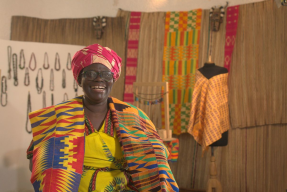
By Adam Grenier, KF6 Sierra Leone
In May 2008, Salone Microfinance Trust (SMT) launched an agricultural loan product to clients in the remote farming villages surrounding the city of Kabala, Sierra Leone. The agricultural loan product is designed to stimulate the agribusiness sector. The loan provides subsistence farmers with a capital infusion into their farms for the purpose of increasing their production. Most commonly, the capital is used to purchase seeds, fertilizer and labor. These are the inputs, so to speak. With more inputs, subsequently, there are greater outputs or yields. Increased yields lead to a source of income for a group of people who ordinarily have no little or no income generation.
I recently had the pleasure of visiting 15 of the first SMT agricultural clients in their home villages. The villages have names like Senekedugu, Gbawuria, Heremakono and Karmosalai. All of the farmers I met had similar aspirations in May at the time of their loan disbursement – more inputs to yield more outputs. They have the land to cultivate, but they did not, until May, have the capital. Agricultural grant programs have come and gone over time. SMT’s agricultural loan program was the first of its kind to reach these remote villages. It could not have come at a better time.
Previously, these farmers could only harvest enough food to feed their families. The harvests were not big enough to generate any income. The loans have enabled many of them to generate income and create jobs for laborers looking to work. The program, however, has not come without its challenges.
While their land was ready to produce a bountiful harvest after planting seeds and laying the fertilizer, Mother Nature has not been as accommodating this harvest season. The rain season begins around May and typically lasts throughout October or early November. This year, however, the rains ceased earlier than ever before. The rains were weak and short-lasting. While most of us would prefer to say ‘good riddance’ to rain, these people’s livelihoods depend on rain. They need rain to survive.
Full crops were ruined by the climate change. Cabbage and carrots are the prominent vegetables grown in the villages. I heard case after case of carrots whose growth was stunted or cabbage patches that were ruined. The farmers rely on historical climate patterns to determine their planting and harvest season. They were completely caught off-guard by this phenomenon. The sudden and dramatic change in the normal climate pattern has caused problems amongst many of our agricultural clients. There’s a temptation amongst the farmers to blame it on global warming (yes, this controversial theory has made its way to West Africa), but it’s much too early to tell.
In addition to the climatic issues, Sierra Leone farmers are working with bad seeds. Again, case after case, farmers complained about the quality of the seeds they receive from the capital city of Freetown. The problem is they don’t have any other choice than what they get from Freetown. The seeds are imported from other West African countries, like The Gambia or Senegal. By the time they arrive to the villages, the seeds are no longer viable. The seeds are not germinating properly and can therefore produce no edible food. Bad inputs lead to bad outputs.
While there are many seed programs in Sierra Leone and in other developing countries, the feeling is that they are not affective particularly in the remote villages. Many of them don’t have the financial backing to sustain themselves and reach these far-out destinations. Are there any solutions to bad seeds? How could we possibly control the amount of rain or this global warming trend? There are solutions to these issues and I think they can all be offered on a micro scale by microfinance institutions around the world.
Let’s first consider the importance of agricultural education and training. In response to his client’s problems with managing the harvest calendar during a particularly finicky rain season, SMT’s agricultural loan officer, Mr. Bombeh Conteh, will lead an effort to train his clients on the importance of crop rotation and diversification. For example, starting this coming January, Bombeh will educate his clients on the planting and harvesting of the Irish potato. The Irish potato is a crop that does not require rain, now that we’re in the dry season, and it can be a valuable food item during a period of time when food and commodity trade is usually slow. They’ll have a product that will generate income during a time when income is generally non-existent. He’ll teach them how to take advantage of a specific season and weather pattern. This education will extend into the next rain season, when he will ensure his farmers get out there early to plant their carrots and cabbage.
SMT could also create a seed program tailored to its clients. As a proven, well-managed organization, SMT can obtain higher quality goods than any individual could in Sierra Leone, especially a poor farmer from a remote village. Theoretically, SMT improves the probability that the farmers yield a crop (and thus are able to repay their loans) by selling them the good seeds at the time of their loan disbursement. You are decreasing the risk of crop failure by providing the farmer with better inputs. They’re going to be able to produce more with good seeds! SMT would stand to gain a little from the sale of the seeds, too. If SMT can establish a partnership with a high quality seed provider from anywhere in the world that’s willing to export to Sierra Leone (*hint hint*), then I think we can get this program up-and-running.
SMT also has the ability to create a stable marketplace for the produce grown on their client’s farms. Today, the farmers face dramatic price fluctuations for the foods they harvest. We spoke to several clients who said one week the price they get for a bushel of rice from a buyer in Freetown is 30,000 Leones or $10 USD. Three weeks later the same buyer is buying the bushel of rice for 120,000 Leones or $40 USD. It’s impossible to time this market. The farmers simply hope for the best when they’re at the point when they must sell their goods or their families go hungry and their laborers go without pay. At the same time, holding on to the rice is contributing to the price fluctuations! By restricting the flow of supply to meet the demand, they are inflating or deflating the going-rate for the commodity. It’s a bad cycle.
SMT, or any other microfinance institution with clients in the agricultural sector, can step in as a business enterprise with strong distribution power and provide the farmers with a reliable, steady market for their produce. The client harvests their foods, they bring them to the SMT office, SMT sells them at a fair price from a central location, and SMT gives the money directly to the client. Retail sales would prove to be a lot more reliable and steady than the risks and fluctuations associated with selling their goods wholesale. SMT is considering this marketplace concept today for possible implementation in the future.
Finally, related to the sudden and dramatic decrease in rainfall this past season. There is a new product opportunity that could serve as a partial solution to this problem. Rainfall insurance is a new idea being floated around in international development circles. Think of rainfall insurance as you would any other type of insurance product.
As an example, let’s say SMT is both the agricultural loan provider and the rainfall insurance agent. SMT can collect a small premium out of the agricultural client’s monthly loan repayment, maybe ½ of 1 percent during the dry season. If there is a drought the following rain season and crops fail because of the lack of water, SMT will pay out on the insurance policies to the farmers. The farmers will use the insurance proceeds to pay back their loans in-full, feed their families, pay their laborers and prepare themselves for the next harvest season. Rainfall insurance is protection against the uncontrollable elements handed to us by Mother Nature.
Farmers in third-world countries are the poorest of the poor. The fruits of their labor sustain life and yet they have nothing themselves to show for it. We cannot neglect the farmers. We need to be creative with the products and services offered to the farming poor in the developing countries. The products and services must be tailored to meet their needs. Microfinance institutions are in a unique position where they can offer many of the solutions to their problems. Their ability to offer these solutions underscores the importance of the financial sector in reducing extreme poverty.
/>PREVIOUS ARTICLE
The Urban Field of Benin (Au Terrain Urbain du Bénin) →NEXT ARTICLE
Finding a Gray Area →













